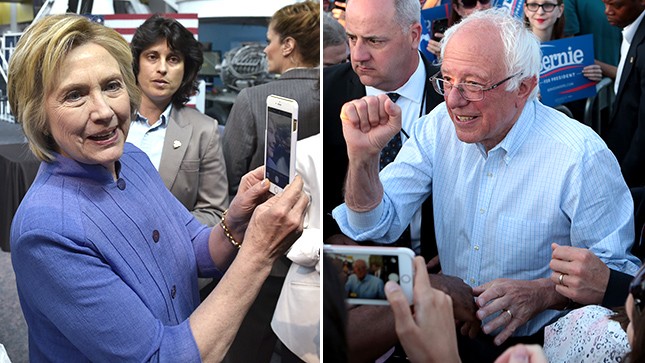
Hillary Clinton’s presidential campaign is shrugging off the refusal by Bernie Sanders to concede the Democratic primary.
Clinton aides and allies say they’ve moved on to focus solely on Donald Trump, the presumptive GOP nominee.
They expect Sanders will eventually offer an endorsement, and say they are content to give him the space he needs to get there.
“At this point, Bernie Sanders is an after thought,” one former Clinton aide said, adding that “the world has moved on.”
“Now it is about Hillary Clinton versus Donald Trump. We are now in full general election mode,” the former aide added.
In an address to supporters on Thursday evening, Sanders edged closer to Clinton, but still sounded like a candidate not ready to call curtains on his campaign.
“Defeating Donald Trump cannot be our only goal,” said Sanders, who met with Clinton earlier this week for two hours and is demanding changes to the Democratic platform — and an end to Democratic National Committee Chairwoman Debbie Wasserman Schultz’s leadership.
“We must continue our grass-roots efforts to create the America that we know we can become,” he said. “And we must take that energy into the Democratic National Convention on July 25 in Philadelphia where we will have more than 1,900 delegates.”
The comments angered some staunch Clinton allies who think Sanders should not only have conceded already but should have done so weeks ago, when it was clear that he couldn’t win the Democratic nomination.
Clinton conceded to then-Illinois Sen. Barack Obama in 2008 days after the last primary.
“What’s he waiting for at this point?” one Clinton confidante said. “It’s over. It’s been over. Time to join the team and help defeat the guy who will do major damage to this country.”
Within the campaign, Chairman John Podesta has been antsy about getting Sanders to join the team, while campaign manager Robby Mook has counseled for giving Sanders time.
Tracy Sefl, a campaign surrogate who served as a senior adviser to the Clinton super-PAC Ready for Hillary, said it would be smart for ClintonWorld to give Sanders space.
“The decision to drop out is obviously an incredibly hard one for anyone and for him, unfathomable perhaps, after all he’s accomplished,” she said.
Lynda Tran, a Democratic strategist and veteran of several political campaigns, said presidential races are “intensely personal” and it takes some time for the candidate to come around to giving a public concession.
Clinton is in good shape in terms of party unity thanks to the recent endorsements from President Obama, who has high approval ratings in the Democratic Party, and Sen. Elizabeth Warren (D-Mass.) who is popular with progressives.
Clinton allies also feel good about their campaign given poll numbers with Trump.
“While I have no doubt there are some folks who are anxiously awaiting the moment when Senator Sanders officially concedes and perhaps endorses Hillary Clinton, the reality is her campaign is already hard at work on the general election fight, with air time up in key states that both promote her personal story and vision for America and hit Donald Trump for his continued divisive and racially-charged remarks,” Tran said.
“And with major endorsements from President Obama, Vice President Biden, Elizabeth Warren, and other key Democratic leaders rolling in on a daily basis, it's clear Hillary Clinton will have no shortage of power players on the campaign trail stumping on her behalf.”
The former Clinton aide was less sympathetic, saying Sanders has lost political capital along the way.
“He played his cards wrong,” the former aide said. “Rather than using his political capital to further his policy agenda, he chose to prioritize petty process fights. Rather than realizing he lost, endorsing Hillary, and using his clout to move the Democratic Party, he chose to look like a sore loser.”
In an interview with The Hill on Friday, Rep. Peter Welch (D-Vt.) said he has warned the Sanders campaign that their candidate has nothing to gain by refusing to concede the race to Clinton, or by withholding his support.
“The sooner he indicates his support for Hillary Clinton the more leverage he’ll have to achieve his goals,” Welch said.
Welch said Sanders’ leverage lies in a small-dollar donor list that is the “envy of Washington,” and the nearly 2,000 delegates who can help him push through a progressive platform or changes to the nominating process at the Democratic convention in Philadelphia in July.
“His leverage isn’t in delaying supporting Clinton or refusing to acknowledge that she’ll be the nominee,” Welch said. “He knows she’s going to be the nominee. I’ve encouraged them to support Hillary Clinton and then move full speed ahead with their goals of influencing the party platform and making changes to the party rules he’d like to see.”
But Wisconsin State Rep. David Bowen, a Sanders superdelegate, said Sanders can be more effective and have more leverage by staying in the race.
“Those millions who believe in him and his message, he’s sending a message to them that he’ll make sure the party moves in their direction,” Bowen said.
Still, while they’re giving him the spaces he needs, Sefl and other Clinton supporters say the hope Sanders comes around in an effective way sooner rather than later.
“When and how he ultimately does is going to speak volumes about what’s next for him and the party,” she said. I just hope it’s soon and I just hope it’s gracious.”


